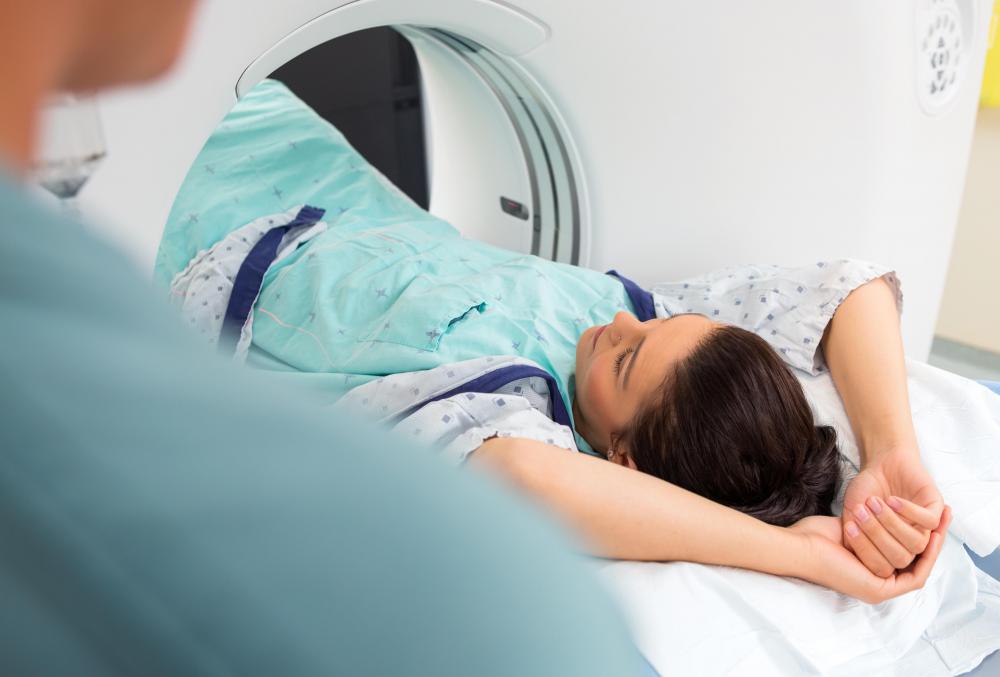At TheHealthBoard, we're committed to delivering accurate, trustworthy information. Our expert-authored content is rigorously fact-checked and sourced from credible authorities. Discover how we uphold the highest standards in providing you with reliable knowledge.
What Is a Retroperitoneal Tumor?
A retroperitoneal tumor is an abnormal and rare growth that develops inside part of the abdominal cavity known as the retroperitoneal space. As the retroperitoneal space is hidden toward the back of the abdomen and the organs there are quite mobile, a retroperitoneal tumor can grow quite large, shifting organs out of its path, before being discovered. Symptoms such as an enlarged belly and abdominal pain may eventually develop. Although retroperitoneal tumors can be benign, or harmless, most often they are cancerous. Surgical removal is the most common treatment, although tumors can recur.
The peritoneum is a thin sheet of tissue that lines the inner walls of the abdomen, covering and enclosing the abdominal organs. At the rear of the abdominal cavity there is an area where the peritoneum does not completely enclose the organs, and this is known as the retroperitoneal space. The kidneys, adrenal glands, large blood vessels and parts of the gut lie in this space, where they are only covered by peritoneum on one side. As the tumor develops, it can affect any of these retroperitoneal organs by pushing them out of place, crushing them or invading their tissues.

Diagnosing a retroperitoneal tumor usually involves a CT scan or an MRI scan, which can show an image of the growth and its effect on surrounding structures. Most frequently, the type of tumor is what is known as a sarcoma, which arises from the body's soft tissues, such as skin and muscle. A retroperitoneal sarcoma is cancerous, and the patient's outlook depends on whether the tumor can be removed completely and whether it has grown into surrounding organs or spread into other areas of the body.

If a tumor is cut out whole before it has had a chance to spread, the patient will have a more positive prognosis, although there is still the chance of recurrence. Some tumors invade major blood vessels and nerves, and this can make it impossible to remove them completely. When a retroperitoneal tumor grows into one of the kidneys, the kidney can be removed. Patients can survive if the remaining kidney is functional.

As well as surgery, methods such as radiotherapy can be used to treat this type of tumor. Radiotherapy is usually given before or after surgery to shrink the tumor or to kill any cells which may have been left behind after an operation. Chemotherapy has not been proven to work in treating this type of tumor, although research is ongoing.
AS FEATURED ON:
AS FEATURED ON:
















Discussion Comments
My daughter has one. Thank goodness it is not cancerous and is a bone and fat tumor. But it is still growing. The real problem is the surgery. The doctor pretty much has to gut the patient and then put everything back in place. Of course, there are post surgery problems of not healing, infections, and hemorrhage. She is 39 years old and may not even live through the surgery. So people who are reading this, count your blessings every day.
@KoiwiGal - To be honest, I think the time is going to arrive within our lifetime that we see medical devices that everyone can just carry around like we do with cell phones now. Watch-like things that sample sweat or skin cells for changes that can signal when something like this is growing.
They still won't be perfect, and I'm not sure if a retroperitoneal tumor would be picked up by such a device, since it probably doesn't do much to the blood stream until it's at the point where it's too late to do much. I guess to some extent we will always be relying on luck.
@Ana1234 - Well, this kind of tumor is quite rare and I think it's probably even more rare for it to grow for a long time without any symptoms at all. Most people are going to start feeling pain when their organs are being pushed aside.
Unfortunately, this kind of thing is the price of life though. Everyone is going to go somehow and if it's not something like this, it will be something else. CT scans and the like are often wrong and they are quite expensive, so it's only the rich who can really afford to have them regularly, and even then it might not help much.
I find that very scary, that people might just think that they are growing a little bit fat, and in reality it's a tumor growing secretly in their abdomen.
It makes me want to just go to the doctor and get a full body scan every six months, so I can be sure that nothing is out of the ordinary.
Post your comments